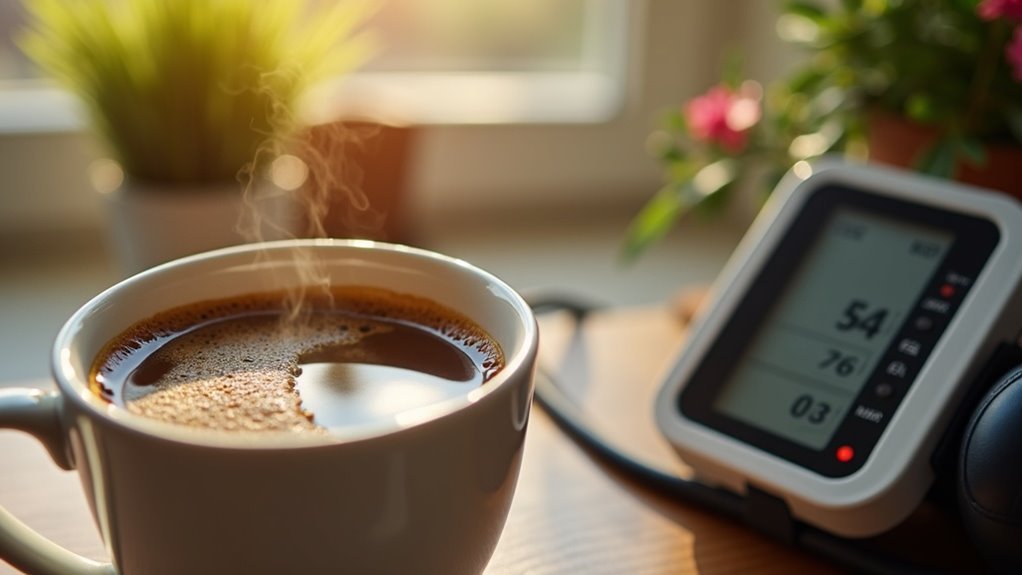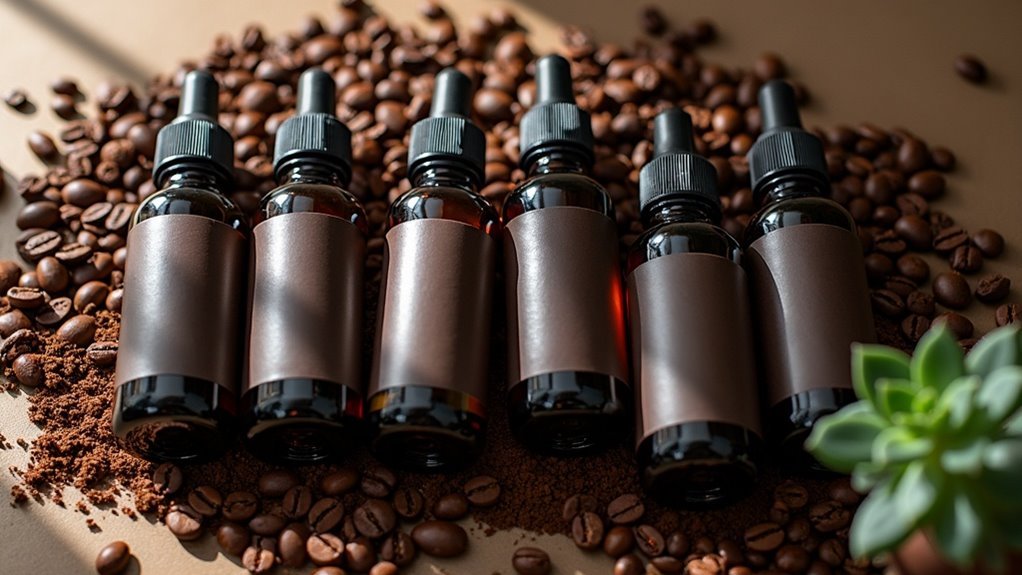Yes, coffee can raise your blood pressure immediately. After consuming coffee, you might notice an increase of 5 to 10 mm Hg, peaking within 30 to 60 minutes. This response varies depending on your caffeine sensitivity and whether you’re a regular coffee drinker. If you’re not accustomed to caffeine, you may experience larger spikes. Monitoring your blood pressure after enjoying coffee can help you manage your health effectively. There’s much more to discover about how coffee and caffeine affect your body.
Key Takeaways
- Coffee consumption can lead to a temporary rise in blood pressure, with levels peaking within 30 to 60 minutes post-drinking.
- Those who drink coffee infrequently may see an increase in blood pressure ranging from 5 to 10 mm Hg shortly after consumption.
- The caffeine in coffee causes vasoconstriction and raises heart rate, which contributes to higher blood pressure levels.
- Regular coffee drinkers often develop a tolerance, typically resulting in a blood pressure increase of less than 5 mm Hg.
- Individuals with hypertension should keep a close watch on their blood pressure after consuming coffee and consider reducing their intake if their blood pressure increases exceed 10 mm Hg.
Understanding Caffeine and Blood Pressure Response
When you enjoy a cup of coffee, you might observe a temporary increase in your blood pressure, particularly if you’re not accustomed to caffeine. This short-term boost generally peaks within 30 to 60 minutes, with an average rise of around 8 mm Hg systolic and 6 mm Hg diastolic.
Enjoying coffee can lead to a temporary spike in blood pressure, especially for those not used to caffeine.
If you’re someone who seldom drinks coffee, you may notice more significant effects. On the other hand, regular coffee drinkers often build a tolerance that diminishes these spikes.
The reason behind this is that caffeine blocks adenosine, a compound that usually helps to dilate blood vessels, while also increasing adrenaline levels.
To better understand your unique response to coffee, consider monitoring your blood pressure before and after you drink it, paying attention to any notable changes to support your heart health.
Immediate Effects of Coffee on Blood Pressure
The immediate effects of coffee on blood pressure can be quite noticeable, especially after your first few sips. Caffeine leads to a temporary increase, with blood pressure peaking within 30 to 60 minutes. You might experience an average rise of about 8 mm Hg systolic and 6 mm Hg diastolic.
This response is generally stronger for those who don’t drink coffee regularly. Caffeine causes vasoconstriction, tightening your blood vessels and elevating heart rate.
If you have high blood pressure, monitoring your blood pressure after coffee is essential, as consistent increases over 10 mm Hg may suggest a need to reduce intake.
Enjoying coffee in moderation can be a delightful experience, but it’s important to be mindful of its effects on your health.
Factors Influencing Individual Responses to Caffeine
Your response to coffee largely hinges on genetic factors that dictate how your body metabolizes caffeine.
If you’re a regular coffee drinker, you might notice less impact on your blood pressure compared to someone who consumes coffee infrequently.
Understanding these individual differences can help you gauge how coffee affects your health.
Genetic Metabolism Differences
Understanding genetic metabolism differences is essential for grasping how coffee affects blood pressure in different individuals.
Genetic factors, particularly variations in the CYP1A2 gene, influence your coffee metabolism rate. If you’re a fast metabolizer, you might notice less dramatic increases in blood pressure after consuming coffee. Conversely, slow metabolizers often experience significant spikes.
Additionally, the ADORA2A gene variant can heighten sensitivity to coffee’s effects, leading to anxiety and sharper blood pressure changes.
Caffeine Consumption Habits
While many people enjoy their daily cup of coffee, individual responses to caffeine can vary dramatically based on consumption habits.
Infrequent coffee drinkers often experience a short-term spike in blood pressure, typically 5 to 10 mm Hg, while those who regularly indulge in their coffee develop a tolerance over time.
Your personal sensitivity to caffeine in coffee is influenced by genetic factors and personal habits, including stress levels and overall health.
Monitoring blood pressure before and after coffee consumption can help you identify how your coffee intake affects you.
Understanding these factors allows for better management of your coffee consumption and its potential impact on blood pressure effectively.
Tolerance Development in Regular Coffee Drinkers
As regular coffee drinkers consistently consume caffeine, they often develop a tolerance that mitigates the blood pressure spikes typically associated with its intake.
This tolerance development leads to several key points about coffee consumption:
- Diminished Blood Pressure Spikes: Habitual coffee consumers experience less significant fluctuations in blood pressure.
- Minor Fluctuations: Regular coffee drinkers see changes typically less than 5 mm Hg.
- Hypertension Considerations: Those with hypertension may not need to limit coffee intake after consulting a healthcare provider.
- Safe Daily Levels: The U.S. FDA indicates that up to 400 mg of daily caffeine, found in several cups of coffee, is generally safe for most adults, reinforcing the benefits of tolerance in coffee consumption.
Long-Term Implications of Coffee Consumption on Heart Health
Coffee consumption has intriguing long-term implications for heart health, particularly for those who drink it regularly. Moderate coffee consumption, around 2 to 5 cups daily, may lower your risk of heart disease and stroke.
While caffeine can raise blood pressure temporarily, habitual coffee drinkers often develop tolerance, making these short-term spikes less significant. Studies suggest that regular coffee drinkers face a reduced risk of mortality from cardiovascular disease, likely due to coffee’s antioxidant properties.
However, if you have severe hypertension, be cautious—consuming 2 or more cups daily might double your cardiovascular disease death risk, highlighting the importance of moderation.
Enjoying coffee in moderation can be part of a heart-healthy lifestyle.
Recommendations for Coffee Consumption and Blood Pressure Management
If you’re a healthy adult, you can enjoy up to 400 mg of caffeine daily without markedly affecting your blood pressure.
However, if you have hypertension, it’s essential to monitor your blood pressure after coffee intake, as consistent spikes may signal the need to cut back.
Consulting with a healthcare professional can help you determine the right balance for your coffee consumption and overall caffeine limits.
Caffeine Intake Guidelines
While enjoying your daily cup of coffee, it’s important to understand the caffeine intake guidelines that can help manage blood pressure effectively. Here are key points to contemplate:
- Healthy adults can safely consume up to 400 mg of caffeine daily, or 4-6 cups of coffee.
- If you have high blood pressure, limit caffeine intake, especially if you notice significant increases post-consumption.
- Monitor blood pressure after coffee to identify individual sensitivity; a rise over 10 mm Hg may require a reduction.
- Consider decaffeinated coffee, which has 97% less caffeine, as a safer alternative while still providing health benefits.
This website is dedicated to all things coffee, providing you with information to enjoy your favorite beverage responsibly.
Monitoring Blood Pressure
Understanding how to monitor your blood pressure in relation to coffee consumption can greatly impact your overall health.
To assess caffeine’s effects, measure your blood pressure before and 30 to 120 minutes after drinking coffee. A spike in blood pressure of 5 to 10 points may indicate sensitivity, prompting you to adjust your coffee intake.
Regular coffee drinkers typically experience smaller increases compared to infrequent drinkers. If you have hypertension, consult a healthcare professional for tailored advice, as you mightn’t need strict limits on coffee.
Gradually reducing coffee consumption can help manage blood pressure effectively without withdrawal symptoms while on blood pressure medication. Enjoying coffee mindfully can be part of a healthy lifestyle.








